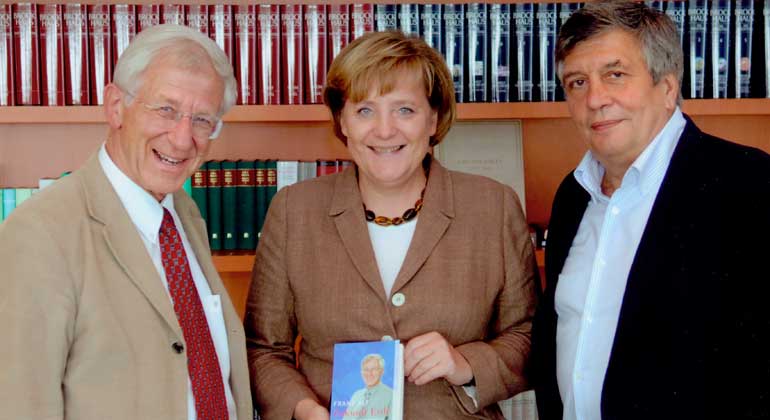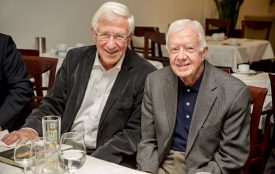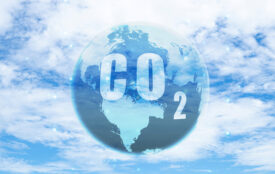IRENA means PEACE
The beautiful Greek word Eirenä, IRENA, means peace. The worldwide use of renewable energies is the basis for future world peace.
At this meeting in 2008 at the Federal Chancellery in Berlin, Hermann Scheer and I were able to convince Chancellor Merkel of the necessity of an International Renewable Energy Agency (IRENA).
The German Chancellor’s global initiative that followed meant that IRENA was able to be founded in 2010. At the beginning, around 60 countries were involved. Today, there are 180 governments in this international organisation, representing over 90 percent of the world’s population. IRENA, based in Abu Dhabi, is now the most important global organisation for the rapid and global expansion of renewable energies. Thanks to IRENA, the expansion of renewables has been much faster than previously assumed. They have now completely eclipsed nuclear energy.
In 2023, an additional 473 gigawatts of renewable energy capacity was installed worldwide: 346 gigawatts of photovoltaics (one gigawatt, GW, is 1,000 megawatts), 116 GW of wind, seven GW of hydropower, four GW of bioenergy, 0.2 GW of geothermal energy and 0.002 GW of ocean energy. Many roads lead not only to Rome, but also to electricity. IRENA Secretary-General Francesco La Camera presented these figures at the agency’s General Assembly in April 2024. He emphasised that these 473 MW of renewables in one year are significantly higher than the entire nuclear industry has built up in the last 70 years. The nuclear industry was only able to add four GW in 2023. The figures also prove that nuclear and coal-fired power plants are not ‘bridges’ to a complete switch to renewable energies, but barriers against them. It is not technical or economic reasons that stand in the way of a rapid switch to a completely renewable energy industry, but still established energy companies and half-hearted policies.
Oil and gas companies continue to do their dirty business. The ‘Big Five’ – Exxon, Chevron, Shell, BP and Total – paid out $100 billion to their shareholders in 2022 and 2023. That is how much the industrialised countries pay poorer countries in climate aid each year. In October 2023, Total CEO Patrick Pouyanne was still raving about new oil fields in Namibia: ‘It’s great that we can still discover and exploit a productive oil field somewhere in the 21st century. In the heyday of climate change, the oil bosses still live in a different world. Shortly before, Pouyanne’ had declared: “I am determined to continue my oil and gas investments because demand is increasing. I respect the opinion of scientists, but there is also real life”. In other words, short-term profits are more important than the well-being of our children and grandchildren. Such oil managers couldn’t care less about “real life”. Such behaviour is tantamount to negligent homicide. And that is a criminal offence.
However, we can and must accelerate the energy transition and thus trigger a tidal wave of technical and economic innovation. This is in line with the wishes of the vast majority of our society, protects the environment and our health, creates millions of future-proof jobs and secures the future of our innovative economy.
The expansion of renewables must be faster than before if the worst of climate change is to be prevented and the Paris target – no more than 1.5 degrees warmer than in the pre-industrial era – is to be achieved.
The majority of Germans have now also taken this message on board. According to a survey conducted by the forsa opinion research institute on behalf of the German Federal Environmental Foundation in December 2024, a clear majority of Germans are in favour of a rapid and greater use of renewable energies: 76 percent are calling for more solar energy, 70 per cent for more wind power, 66 per cent for more hydrogen from renewable energies, only 29 per cent for nuclear energy, 13 per cent for gas and only five per cent for coal.
The rapid transition to 100 per cent renewable energies is the ‘energethical imperative’ (Hermann Scheer) of our time – and that includes for the new year 2025. When ethics and technology come together, ‘then we can do it’ (Angela Merkel).
‘The most important view of the world at the moment: optimism’ – wrote the Süddeutsche Zeitung on the last day of 2024.








